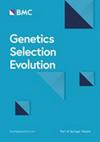对六个奶牛品种的元分析揭示了抗乳腺炎的生物相关候选基因
IF 3.1
1区 农林科学
Q1 AGRICULTURE, DAIRY & ANIMAL SCIENCE
引用次数: 0
摘要
乳腺炎是一种给奶牛业带来巨大损失的疾病。从基因上提高奶牛对乳腺炎的抵抗力是减轻其负面影响的一种可行方法。对多个品种的临床乳腺炎(CM)及其指示性状体细胞评分(SCS)的全基因组关联研究(GWAS)进行荟萃分析,是确定影响乳腺炎抵抗力的功能性遗传变异的有力方法。我们利用来自六个奶牛品种的 30,689 头和 119,438 头动物,分别对八个和十四个有关 CM 和 SCS 的 GWAS 进行了荟萃分析。荟萃分析方法的选择适当考虑了 GWAS 数据的多品种结构。我们的研究揭示了与乳腺炎发病率相关的 58 个先导标记,其中包括 16 个与动物 QTLdb 上的先前确定的数量性状位点 (QTL) 不重叠的位点。基于基因的分析和基因组特征富集分析等 GWAS 后分析技术确定了影响乳腺炎的 31 个候选基因和 14 个可信的候选因果变异的优先次序。我们的候选基因列表有助于阐明乳腺炎抗性的遗传结构,并为乳腺炎的预防或治疗提供更好的工具,最终促进更可持续的动物生产。本文章由计算机程序翻译,如有差异,请以英文原文为准。
Meta-analysis of six dairy cattle breeds reveals biologically relevant candidate genes for mastitis resistance
Mastitis is a disease that incurs significant costs in the dairy industry. A promising approach to mitigate its negative effects is to genetically improve the resistance of dairy cattle to mastitis. A meta-analysis of genome-wide association studies (GWAS) across multiple breeds for clinical mastitis (CM) and its indicator trait, somatic cell score (SCS), is a powerful method to identify functional genetic variants that impact mastitis resistance. We conducted meta-analyses of eight and fourteen GWAS on CM and SCS, respectively, using 30,689 and 119,438 animals from six dairy cattle breeds. Methods for the meta-analyses were selected to properly account for the multi-breed structure of the GWAS data. Our study revealed 58 lead markers that were associated with mastitis incidence, including 16 loci that did not overlap with previously identified quantitative trait loci (QTL), as curated at the Animal QTLdb. Post-GWAS analysis techniques such as gene-based analysis and genomic feature enrichment analysis enabled prioritization of 31 candidate genes and 14 credible candidate causal variants that affect mastitis. Our list of candidate genes can help to elucidate the genetic architecture underlying mastitis resistance and provide better tools for the prevention or treatment of mastitis, ultimately contributing to more sustainable animal production.
求助全文
通过发布文献求助,成功后即可免费获取论文全文。
去求助
来源期刊

Genetics Selection Evolution
生物-奶制品与动物科学
CiteScore
6.50
自引率
9.80%
发文量
74
审稿时长
1 months
期刊介绍:
Genetics Selection Evolution invites basic, applied and methodological content that will aid the current understanding and the utilization of genetic variability in domestic animal species. Although the focus is on domestic animal species, research on other species is invited if it contributes to the understanding of the use of genetic variability in domestic animals. Genetics Selection Evolution publishes results from all levels of study, from the gene to the quantitative trait, from the individual to the population, the breed or the species. Contributions concerning both the biological approach, from molecular genetics to quantitative genetics, as well as the mathematical approach, from population genetics to statistics, are welcome. Specific areas of interest include but are not limited to: gene and QTL identification, mapping and characterization, analysis of new phenotypes, high-throughput SNP data analysis, functional genomics, cytogenetics, genetic diversity of populations and breeds, genetic evaluation, applied and experimental selection, genomic selection, selection efficiency, and statistical methodology for the genetic analysis of phenotypes with quantitative and mixed inheritance.
 求助内容:
求助内容: 应助结果提醒方式:
应助结果提醒方式:


